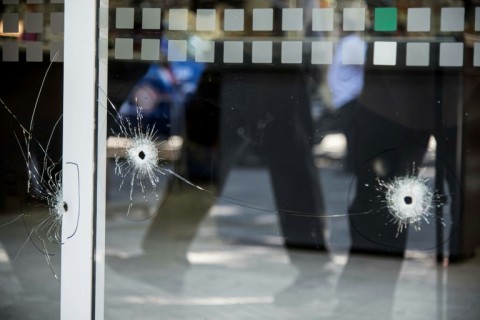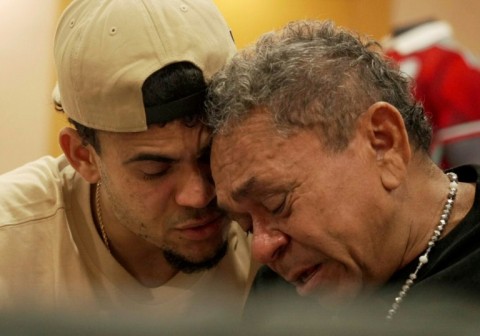BOGOTA - A wave of crimes against South American footballers has underscored the risks faced by players loath to return home from overseas clubs to a region where they, or their loved ones, risk being kidnapped, blackmailed or targeted by gangs with a message to send.
In recent months, the sport has been rattled by threats against the family of Argentine forward Angel Di Maria, the kidnapping in Colombia of Luis Diaz's father, and the blackmailing of Peruvian striker Paolo Guerrero's mother in a region of the world ravaged by drug trafficking and gang violence.
"These type of violent actions directly threaten the economy and sports success of the clubs," Argentine club Rosario Central has said of the threats against Di Maria, who opted to remain in Portugal.
- Drug gangs -
In March, family members of Di Maria received a note threatening their lives if he returned home to play for any club in the city of Rosario -- Argentina's third-largest city that has recently seen an explosion in drug-related crime.

The 36-year-old winger for Benfica in Portugal, had earlier stated his desire to play once more for his boyhood club, Rosario Central, and win a Copa Libertadores before he retires.
Argentine authorities said at the time the note contained a threat from "criminal organizations" putting on a show of strength.
The footballer has not spoken about the incident in public, but an Argentine sports TV channel cited sources close to Di Maria saying he had ruled out a return to "prioritize the safety and health of his family." Di Maria is now reportedly in talks to pursue a career in Major League Soccer.
Also in Rosario, gunmen opened fire last year on a shop belonging to the family of World Cup-winning Argentine captain Lionel Messi's wife.
They left a threatening message for the footballer in what was also interpreted as gangs flexing their muscle.
Further north, in gang violence-torn Ecuador, 34-year-old forward Enner Valencia has recently abandoned plans for a return to home team Emelec from Brazil, where he plays for Porto Alegre club Internacional.
"I would love to go to Emelec... try to help the team that gave me everything, but I would not bring my family to Ecuador," he told an Argentine journalist last year.
Valencia's once-peaceful homeland is grappling with a shocking rise in violence and homicides as narco gangs have grown ever stronger and fight bloody turf wars.
- Kidnapping -
In 2022, Valencia's sister was taken and held hostage for more than a week near the Colombian border until she was rescued by an anti-kidnapping and anti-extortion unit of the national police.

Last October, guerrilla fighters in Colombia kidnapped the father of Liverpool footballer Luis Diaz.
He was held for 12 days before being freed under pressure from the government negotiating a peace deal with the ELN guerrillas.
The group described the kidnapping by members under its command as a "mistake."
Colombia's top scorer Radamel Falcao Garcia (38) subsequently announced he had renounced plans to return to Bogota club Millonarios from Spain.
"You have to see the situation of the country as it is at the moment, a little complex...," he said in an interview after the Diaz incident.
In March this year, Colombian police reported that criminals tried to trick former Colombian international Carlos Bacca into paying a ransom for his sister and brother-in-law.
They had somehow led the couple into an area without cellphone reception, then when they were offline and unreachable, called Bacca to demand a ransom for their "release." Media reports say Bacca paid a relatively modest ransom of $250.
- Extortion, threats -
Extortion, one of the most common crimes perpetrated by criminal groups in Latin America, is ravaging Peru in particular.

In February, striker Paolo Guerrero became a target after signing with the club Cesar Vallejo.
Soon, members of the gang "Los Cachacos de Yolin" began extorting his mother, Petronila Gonzales.
They were arrested, and Guerrero decided to stay on after demanding security guarantees from his new club.
And then there are the threats that regularly befall footballers in the region.
In at least one case it prompted a player -- the attacker known as Willian -- to leave Brazil.
Soon after returning from Arsenal in 2022 to play for home side Corinthians, Willian opted to go back to England after he and his family received threats from supporters unhappy about his contribution to his new team.
- by David Salazar in Bogota with Regional Offices

